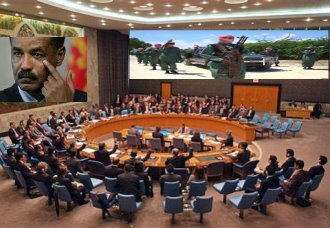Security Council falling out means weaker sanctions for Eritrea
By KEVIN KELLEY DISAGREEMENTS AROSE among Security Council members resulting in imposition of a weaker set of sanctions against Eritrea than had originally been advocated by the United States and some of its allies. The new punishments, which

By KEVIN KELLEY
DISAGREEMENTS AROSE among Security Council members resulting in imposition of a weaker set of sanctions against Eritrea than had originally been advocated by the United States and some of its allies.
The new punishments, which augment an arms embargo and other sanctions levied in 2009, will include travel bans and asset freezes on additional Eritrean officials.
But efforts to squeeze Eritrea’s economy by targeting its growing mining sector were softened in the resolution adopted by the Security Council on a 13-0 vote, with Russia and China abstaining. Compromise language calls for countries to promote “vigilance” in their companies’ dealings with Eritrean mining interests to ensure that proceeds are not used to destabilise the Horn.
Similarly, the resolution stops short of prohibiting Eritrea from taxing its nationals who live abroad. The Security Council instead “condemns” use of the diaspora tax to jeopardise stability in the Horn, and it urges Eritrea to “cease using extortion, threats of violence, fraud and other illicit means to collect taxes” from its citizens living outside the country.
Russia’s UN ambassador suggested after the council’s vote, however, that the Monitoring Group had not presented sufficient evidence of Eritrea’s intention to attack the AU summit in January. South Africa, which currently holds one of the rotating seats on the Security Council, also expressed doubts about the conclusiveness of the evidence contained in the July report.
To US Ambassador Susan Rice, however, the evidence of an Eritrean plan to carry out a terrorist attack was “very compelling, and we have full confidence in its veracity.” Ms Rice said she didn’t understand Russia’s misgivings.
East African nations were united in their condemnations of Eritrea’s behaviour regarding Somalia. Representatives of Kenya, Uganda, Ethiopia, Djibouti and Somalia all urged the Security Council to vote in favour of the sanctions.
Gabon and Nigeria, which also hold temporary seats on the council, joined South Africa in voting “yes” on the resolution.
Kenyan UN Ambassador Macharia Kamau said he hoped the new sanctions would be sufficient to persuade Eritrea to change its policies regarding Somalia. “Eritrea has a clear obligation to heed the strong message that the international community has sent,” Ambassador Kamau declared.
The East African

Haqi tezareb December 11, 2011
4. While we are talking about events in Ethiopia, there is this question that repeats quite often. Ethiopia has so many ethnic groups, there is a lot of respect to all its languages and ethnic groups since 1991. Ethiopian students study in their own ethnic languages very proudly and broadcast their languages in radio and some on TV. They will soon open four more TV channels. They need it because they are 90 million people. Eritrea is very lucky to have one for 4 million people.
Some one asked: What is the language of the Amhara Jeberti and the Tigrayan Jeberti in Ethiopia? How can Salih Gadi try to force Arabic to Eritrea? Why is he ashamed of his own language? Should the kunama, Afar or Tigre languages deserve respect in their own homeland, the way Arabic is respected in its homeland in Saudi Arabia?
HGDEF December 12, 2011
As far as I know there is no language called Jeberti. It doesn’t even exist at a dialect level. Would that count a language if some one mixes arabic words into tigrigna like the Deki Asmara do? What does make the jeberti case special from the difference between muslim Bilen and Christian Bilen? Or the Tigre christian which use some tigrigna words because they read the bible in tigrigna? They may call themselves a Biher or whatsoever it is upto them I dont have any objection. But trying to distort facts in order to be called a Biher is stupid. Who is Jeberti by the way? Is everyone who is muslim and speakes tigrigna /”Jeberti” a Jeberti? Some of the jeberti I know are ethnically Tigre or Saho or others who lost the language because of migration or proximity to Tigrigna speaking areas.